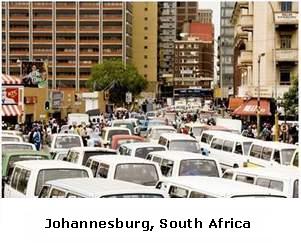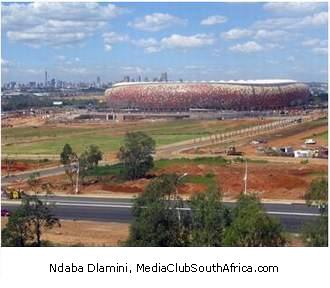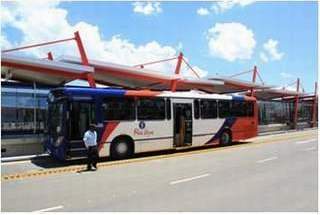 ReConnect Africa is a unique website and online magazine for the African professional in the Diaspora. Packed with
essential information about careers, business and jobs, ReConnect Africa keeps you connected to the best of Africa.
ReConnect Africa is a unique website and online magazine for the African professional in the Diaspora. Packed with
essential information about careers, business and jobs, ReConnect Africa keeps you connected to the best of Africa.


 London-based Yingni Lu reports on her visit to South Africa and how the country is addressing the challenge of sustaining its economic and social transformation.
London-based Yingni Lu reports on her visit to South Africa and how the country is addressing the challenge of sustaining its economic and social transformation.
South Africa is on a quest to transform itself to tackle the social challenge for sustainable economic growth, after it proved to the world that Africa can deliver on a global stage a few months ago by hosting the 2010 FIFA World Cup successfully, according to a speech by Dina Pule, Deputy Minister in the South African Presidency.
The South Africa government recently announced its new growth plan to unleash the power of a broader part of the population and to leverage regional markets.
I was lucky enough to join a group of 20 international journalists who experienced the vast opportunities that the country can offer. On my first trip to South Africa, I was impressed by South Africa's courage in recognising its weaknesses as well as the progress it has made to be more competitive and to build its human capital.
It was also a special experience for me to have the opportunity to interact with a few government ministers. I felt that if everyone in the country has the same determination, courage, wisdom and execution skills, it will be only a matter of time before South Africa is able to achieve its goals.
The real GDP increased by only 2.6% during the third quarter of 2010, well below the market expectation, which provides a great opportunity for the country to debate the crossroad that it is facing: whether to continue the easy export-led growth model that is energy intensive and may deplete resources, or to adopt a more sustainable one and invest in human capital development.
In an in-depth interview with we journalists, Mr. Ebrahim Patel, the Minister of Economic Development, stressed the need to build a 'stable democracy' to achieve sustainable economic growth by recognising and working on the challenges, especially on the social side, and by setting a target to create 5 million jobs in the next ten years.
This new growth plan is to target unemployment, which has been identified by the IMF as one of the biggest challenges to economic growth, and to mobilise that part of the population that is currently not able to take part in the nation's development.
As an immediate start, the country is at work on an 800 billion Rand infrastructure programme, which will not only create jobs, but also alleviate the constraint for future economic growth.
Another challenge faced by the country is education. According to the World Economic Forum, education, together with health, is one of the key constraints on growth in South Africa. Also according to HDI ranking, South Africa hasn't shown much progress since 2005, even though it has experienced almost the strongest growth since the end of apartheid. This confirms the finding from many other countries that economic growth doesn't necessarily bring improvement in education and health. This challenge will potentially undermine future competitiveness and attraction to investment in terms of workforce availability and productivity for South Africa.
For a country with great pride in its achievements since 1994, it takes courage and strong political commitment to recognise the nation's weaknesses, to encourage national debate and to put it into government policy. The new growth path has therefore identified the skills gaps that need addressing for sustainable growth, given the previous under-investment in engineers, technicians and artisans.
South Africa is now intent on improving education and training and has established a number of stretch targets and policies, such as one million more young people enrolled in education. Moreover, state-owned enterprises are obliged to expand their intake of people into in-house training, so as to provide a bigger base of artisans and technicians for the country. However, the country also recognises the immediate need for highly skilled engineers and workers and opens the door to attract people from elsewhere.
There is a strong commitment from the government to set a 'sector minimum wage' as well as a 'salary cap' for high earners. This is aimed to achieve 'income equality' and break the strong collective negotiation power, the latter of which was identified as low 'labour market efficiency' and has direct impact in doing business in SA.
Foreign investors will also be happy to see that the country is working to improve the physical space, bulk energy, access to ports, etc. in order to provide 'ready-made capacity'.
Another ambition shown in the new growth plan is for South Africa to help the African continent grow in a balanced way. The country's ports lie at the centre for goods being shipped from other African countries across the continent. The current railway infrastructure sees railway lines in Africa start from towns or cities in the middle and go down to the ocean, missing links between each other. This has constrained intra-African trade, which consists of only 10% of the total international trade of African countries, much lower than the figure of 70% for intra-European trade. This also points to the direction that South Africa needs to focus on in terms of infrastructure.
During the media tour to South Africa, I had the opportunity to listen to a panel discussion on how the infrastructure design for the World Cup has brought a legacy of culture with connectivity for the future of the country and its cities.
'Architecture is a tool for social change and development', said Hanning Rassmus, architect and the chair of panellists, 'and growth happens by design.'
 Watching television, I noticed the frenzied discussions on how many different technologies have been used to build Olympic stadia in China and in the UK. However, the design of Soccer City Stadium particularly struck me because the design of the stadium is not about technology, but about its impact on people's lives.
Watching television, I noticed the frenzied discussions on how many different technologies have been used to build Olympic stadia in China and in the UK. However, the design of Soccer City Stadium particularly struck me because the design of the stadium is not about technology, but about its impact on people's lives.
For Soccer City Stadium, it surprises me as an 'inclusive design' with a much bigger vision to encourage poor people that used to feel excluded from the mainstream economy to take part in it by connecting them to the rest of the city.
There are hundreds of soccer fields in Johannesburg which are created by people using them every day. The location of Soccer City Stadium is one of them. It is without obvious commercial value because it is so isolated and is on top of a toxic abandoned gold mine field. However, it is lucky and full of potential because it is right between Soweto and Sandton and can link the south and north together.
This brand new stadium has been built and hosted the opening of the World Cup. To connect the different parts of Johannesburg, a Bus Rapid Transit (BRT) line was also built.
There are many ideas on how to develop the area, including a conference centre, entertainment centre and housing capacity. However, the stadium has linked the two parts of the city together. It is time for people to work together and make those ideas a reality.
For a city girl living in London, it is very difficult for me to imagine how difficult it could be to provide public transportation because buses and underground system are taken for granted. For Johannesburg, it is a long and tough process to create a satisfactory transport system.
The mini-bus taxi is unique to this historically divided society because during the apartheid era transportation was deliberately designed to separate the poor and the rich. 
In Johannesburg, 72% of residents cannot afford private transportation and use the mini-bus taxi. Mr. Pei, a journalist based in Johannesburg for the past two years, described the mini-bus taxi, the only transportation method traditionally used by poor people, as 'no other choice' and their only way to go to work.
Rea Vaya, which means 'we are going' in township slang, is the initiative by the Johannesburg government to not only provide public transportation links, but also motivate and enable people to take part in the development and growth of South Africa.
During my interview with Councillor Rehana Moosajee, a member of the Johannesburg Mayoral Committee for Transportation, she explained how they persuaded key leaders from taxi industry that Rea Vaya was not merely a temporary transportation for the World Cup, but critical for the future of transportation and even for the city.
I was touched by the approach they have adopted to involve key leaders from the taxi industry and give them a stake in the taxi industry. Instead of a top-down approach, Rehana and her team invited two delegations from taxi companies to visit South America and study how their local bus and taxi industry has evolved.
In Colombia, where the situation is similar to South Africa, these delegations learned how future trends, such as economic development and climate change, impact urban transportation, and that it is possible for taxi companies to benefit from the transition. More importantly, they experienced and learned from people that had faced the same dilemma as they did and could trust, rather than being told the story. This study tour provided a solid foundation for these key leaders and, during the launch of Rea Vaya, the team also provided technical advice and independent facilitation to help the taxi companies transform their business.
Rea Vaya is an on-going project designed to face the severe congestion faced by Johannesburg residents. However, for me, it is more than that: it gives people the possibility and the hope to seize opportunities and to work for a more dignified life.
